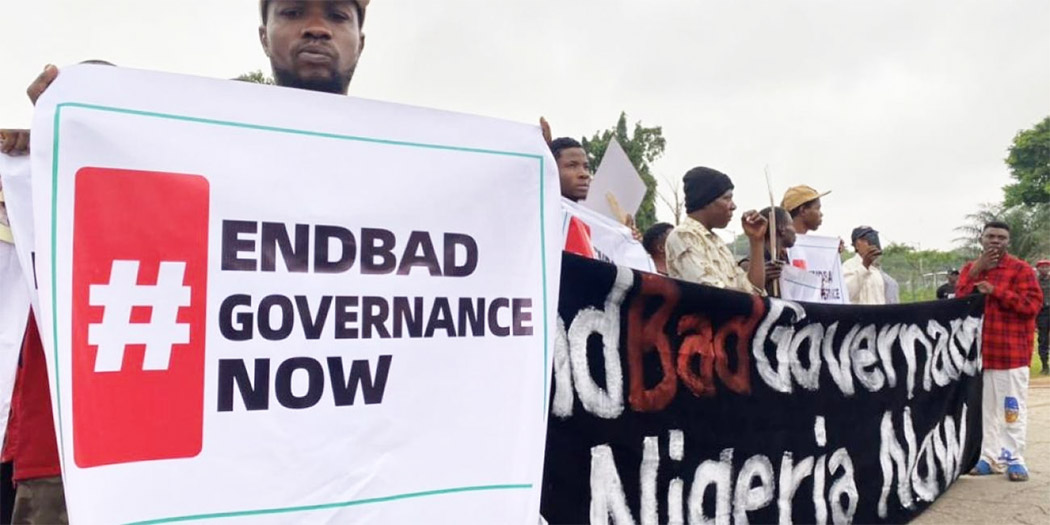What began as a resolute stride to demand good governance in Africa’s most populous nation appears to be grounding to a reluctant death. As opposed to the locked shops and deserted streets that marked the onset of the protests, the streets are alive once again and major markets across Nigeria are bustling with commerce. The revival of commerce in most Nigerian cities suggests a lull in the nationwide protests, which took off less than a week ago. As can be seen in cities such as Lagos and Abuja, momentum for the EndBadGovernance protests have faltered in recent days amidst state curfews, violent clashes and a general suppression of the rights to protest.
Recall that the EndBadGovernance protests draw inspiration from the month-long Kenyan Gen-Z protests that have killed at least 50 people, with scores injured. Yet where the Kenyan mass movement succeeded in reversing a controversial tax bill and prompted a shakeup of the president’s cabinet, Nigeria’s ongoing hunger demonstrations appears to lack the vim to bring about similar outcomes. In addition to pervasive hunger, the EndBadGovernance protests take a swipe at the economic stagnation and escalating living costs that have taken a severe toll on many Nigerian households. Isn’t it unusual that, despite these biting socio-economic crises, Nigerians seem less determined to champion historic transformations like their Eastern neighbour?
To get a sense of this lethargy, look no further than the last nationwide anti-police brutality campaign—EndSARS protests. By all measures, the EndSARS protests were in 2020 what the Gen-Z protests are in Kenya today. Coming in the middle of a lockdown amid rising costs of food, the EndSARS protests became a lightning rod for pent-up public ire. The tensions, which began brewing on X(then Twitter), spilled over to the streets of Lagos, igniting the largest decentralised protests in Nigeria’s democracy. A great unrest marked this period, which saw the looting of palliative-filled warehouses and the destruction of state property. It seemed like Nigerian youths had finally brought the high-handed aging political elite to its knees. However, the indiscriminate killing of 12 EndSARS demonstrators at Lekki Toll Gate deflated the hope of a momentous victory against the government. It left a festering sore in the public psyche. Akin to the 2020 protests, there have been episodes of anarchy in several regions of the country, largely initiated by political thugs.
The protests have provided ground for thuggery to wreck damage and sully the noble intentions of the protesters. Consider the looting in Kano, for instance. Additionally, it has deviated from its focal points, leading to the hoisting of the Russian flag in certain regions. Rather than a movement united in purpose, the EndBadGovernance demonstrations have been divided in mission.
Perhaps unity among the various regions is even one strong reason for the declining momentum. Except for the north, the mass movement has recorded lower turnouts than seen in previous nationwide demonstrations. In fact, there has been no echo of agitation in many states in the South east in what is an apparent boycott. In Cross River, for example, the state governor cautioned residents against protesting or risk going to jail. Elsewhere, protests have been greeted with a heavy show of force. States flexing heavily armed security personnel days before the protests came off as a brazen attempt to cow protesters into submission. Yet it was a painful reminder of a country with no regard for human life nor the rule of law. For many Nigerians, all of these strong-arm tactics only recalled the memories of the Lekki carnage, spreading a mixed feeling of fear and hate.
Nearly 4 years since the EndSARS protests, the haunting memories of the Lekki Toll Gate shootings continue to dampen appetite for further protests in a country where protest venues have become death traps. The actions of the government have only deepened this anxiety.
Despite his uninspiring broadcast on Sunday, 4 August, President Tinubu has extended the olive branch, urging protesters to shun further agitations and opt for dialogue instead. It remains to be seen how the protests will pan out in its remaining days. Yet the ongoing outing offers no ray of hope of a momentous change in economic policies, as seen in Kenya and beyond. The dire economic straits are no just reason for Nigerians to sacrifice their lives in a protest.
Nationwide protests in Nigeria demanding good governance seem to be losing momentum. Initial fervor witnessed locked shops and deserted streets, but now commerce is flourishing again in cities like Lagos and Abuja, highlighting a lull in the demonstrations. Unlike Kenya’s impactful protests which reversed a controversial tax bill, Nigeria's EndBadGovernance protests are faltering amid state curfews, violent clashes, and repression of protest rights.
The protests, reminiscent of the EndSARS movement of 2020, initially showed promise but devolved into thuggery and division. Regional disunity, particularly in the South East, and severe government crackdowns have deterred participation. Memories of the Lekki Toll Gate shootings continue to haunt potential protesters, fostering a climate of fear and hesitancy.
Despite President Tinubu’s call for dialogue and a peaceful resolution, there is no clear indication that the ongoing protests will lead to significant changes in economic policies or governance. The harsh reality remains that Nigerians are hesitant to risk their lives for uncertain outcomes in a suppressive environment.






